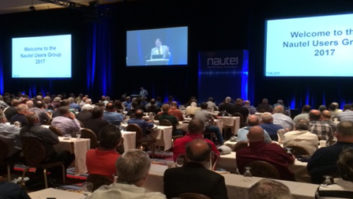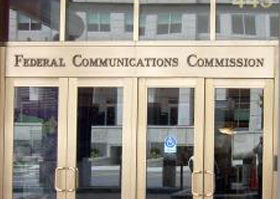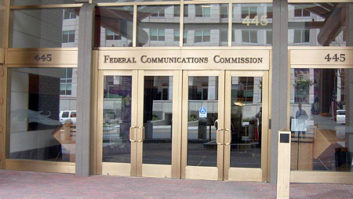FCC Commissioner Michael O’Rielly addressed a luncheon at the American Enterprise Institute on Jan. 21. Here is a transcript provided by the FCC.
Let me start by thanking the American Enterprise Institute, particularly Jeff Eisenach, for inviting me here today. It was heartening to learn that someone of Jeff’s caliber and command of the subject matter would find a welcoming home at one of the premier Washington organizations focused on intellectual problem solving and scholarly work. When I use the term scholar, I am reminded of Ralph Waldo Emerson’s use, “Neither years nor books have yet availed to extirpate a prejudice then rooted in me, that a scholar is the favorite of Heaven and earth, the excellency of his country, the happiest of men.”
For many years, I have worked with AEI on pressing issues important to the American people and our economy. I vividly remember reading the works of AEI scholars and others when advising Members of Congress regarding housing policy, especially after the financial difficulties in 2008 and 2009. I also worked closely with AEI on trade and transportation policy. But it is in the fields of communications, the Internet and regulatory overreach where our views and interests have most often aligned.
On that note, it is my goal to discuss four discrete matters facing the commission. These items are rather disparate, but given their timeliness, I hope you will forgive me. To the best of my ability, I plan to cover certain aspects of: (1) municipal broadband; (2) net neutrality and the Universal Service Fund; (3) over-the-top video offerings; and (4) Broadcast Spectrum Incentive Auction.
I’ll start with a topic that I didn’t expect to have to discuss so soon in the year: the administration’s push to get the FCC to preempt state laws on municipal broadband. Specifically, the FCC has been called upon to override a range of state restrictions on the provision of broadband by local communities. Regardless of the timing, however, the issue generates a number of fundamental concerns.
First, the commission lacks authority to preempt these laws. Proponents rely on Section 706 of the Telecom Act, but I have made clear that I do not think that the provision gives the FCC affirmative authority to do anything. Yet even if it could be read to authorize something, the provision still does not contain the clear statement of Congressional intent necessary to preempt state laws. In fact, we’ve been down this path before. Certain municipalities argued that Section 253 of the Communications Act preempted a state law barring its political subdivisions from offering telecommunications services. Even though Section 253 contained preemption language, the Supreme Court held that there was no clear statement that Congress intended the provision to be used in that manner. In contrast, Section 706 does not even contain preemption language. Actually, Section 706 calls upon both the FCC and state commissions to act, so it is hard to see how the provision could be read to limit state action. Using this provision also ignores the fact that, even after the enactment of Section 706, proponents of municipal broadband continued to push a number of legislative efforts to preempt states, thereby recognizing that the commission lacked authority. Those efforts never made it into law.
Second, I am concerned about the FCC meddling in state policy on municipal broadband when there is a long track record of projects overpromising and underperforming, leaving taxpayers holding the bag. This is not surprising. Running a communications network is expensive and demands specialized expertise. Indeed, many electric utilities that have a history of serving their communities have found it difficult to expand into the communications business. Despite the preferential treatment sometimes provided, including better access to rights of way, there are still high costs to enter, deploy and connect consumers. And we shouldn’t be oblivious to the probability that some localities will seek to cross-subsidize their broadband offerings providing advantages over other providers. Is the commission prepared to address this issue?
Moreover, the service offerings have not been as attractive or provided as much revenue as some providers initially anticipated. Consumers are only willing to pay so much more for faster broadband service. In addition, to be competitive with other providers in the area, municipal providers find that they need sufficient video offerings. But we’ve seen that municipal broadband customers typically get fewer channels at greater cost. Accordingly, consumers that are promised faster speeds and more services at lower prices often end up paying far more than what was initially envisioned.
Third, I am concerned about the community-wide impact of overbuilding existing providers, particularly in rural areas that receive federal Universal Service support. The foundation of the U.S. economy is for private companies to offer products and services — not government-sponsored companies. Our desire to increase competition in the communications industry cannot override our deep concern over the negative impact of governments as actors in the market.
Further, the high-cost Universal Service program supports deployment in many rural areas where it is uneconomical for even a single provider to offer service. In return for USF funding, providers are required to serve not only the towns, but also consumers living in more remote areas where costs are much higher. If a municipal provider comes in to serve the town, it changes the dynamics for more remote customers
Additionally, it could require an increase in Universal Service subsidies to the providers competing with a municipal network, leaving less for other high-cost areas. That’s because as subsidized rural providers lose lines, the support required to defray the costs over the remaining lines increases. With more support going to those lines, less is available to other providers to serve unserved parts of their communities.
Lastly, I challenge everyone to examine the specific state laws and restrictions that proponents oppose. If you focus closely, as some of those in this room have, you will see some restrictions that are not all that problematic or unreasonable. For instance, a number of states require localities to get a referendum passed before committing taxpayer resources. So the legislators in those states decided to ensure that the taxpayers in the locality actually support municipal broadband before allowing it to move forward? That sounds like democracy to me, not an unreasonable burden. In fact, the residents in a number of Colorado towns passed the appropriate referendums in the November election, so there is concrete evidence that it’s doable. How is it possible that the commission would contemplate overturning this?
As I’ve said before, broadband deployment challenges need to be examined holistically. As the FCC considers particular actions to address these challenges, it needs to assess both the individual and additive impact of its actions on the competitive environment. The case of municipal broadband is no different.
Over the last many months, in fact years, much has been said on the topics of net neutrality, reclassification of broadband as a Title II service, and forbearance. I know you are all well aware of these issues and have analyzed them closely, and since the commission is expected to consider the issue next month, I won’t rehash all of them here today. Rather, I want to focus on one aspect that has not received as much attention in the record: the impact of reclassification on USF fees.
Today, statutorily-defined “telecommunications carrier[s]” and certain other “provider[s] of interstate telecommunications” pay a percentage of their interstate and international end-user revenues to support the federal Universal Service Fund, which provides funding for the FCC’s universal service subsidy programs. Providers pass these costs on to consumers through fees on their phone bills. To put this into perspective, back in 2004, the fund spent roughly $5.3 billion and the percentage was just under 9%. Now, the fund is nearing $10 billion and the percentage stands at almost 17%. There are a number of reasons for this near doubling of the fund over 10 years but increased spending is a big culprit.
Let’s be clear, however, what net neutrality or reclassification means for Internet users. If the commission decides to reclassify broadband as a telecommunications service, broadband providers (as telecommunications carriers) will be required by statute to pay into the fund. While there has been a lot of rhetoric trying to dispute the size and scope of taxes and fees that consumers would be hit with, no one can rightly disagree with this conclusion. And providers will undoubtedly pass those fees on to consumers just as telecommunications providers do today. That means consumer broadband rates will go up. While it is true that the commission could forbear from the requirement, this is likely to be a heavy lift given the barriers the commission has imposed in its interpretation of forbearance under the statute. Additionally, I view it as highly likely that a number of parties will fervently oppose such forbearance. In fact, we’ve already started to see filings in the record and public pronouncements to reject any type of Section 254 forbearance.
I strenuously oppose the prospect of imposing new fees on broadband for two reasons. Fundamentally, it deters broadband adoption and use. In the past, the commission and certain consumer groups have recognized that imposing fees on broadband impacts broadband adoption for certain consumers. With so many families still struggling and small businesses trying to regain their footing in this economy, I am worried about imposing additional burdens. Having worked on the Internet Tax Moratorium for numerous years, I know that there is near unanimous views in Congress that state or local taxes on Internet access would directly deter the ability of consumers to obtain and utilize the Internet. If that is an accepted premise, as it should be, the same concept should apply to the net neutrality debate and its certainty to increase consumer bills. On the one hand we cannot oppose taxes and fees by localities on Internet access and yet on the other suggest that expanding USF fees to broadband would not have the same impact.
Some argue that by assessing broadband, the current contribution factor will drop dramatically. That may be true for currently assessed services but it just means that fees will be applied to more parts of the same families’ bills. In other words, it would just spread the pain to more people and services. I am certain that this is a goal for some people: install a smaller fee across the widest possible reach and maybe consumers will not notice or care enough.
More importantly, the idea that such maneuvering would result in a lower contribution factor assumes that spending remains constant. I have no confidence that will be true. The commission just adopted a $1.5 billion annual increase in the E-rate program and seems reluctant to establish an overall cap on the fund as a means to keep spending in check. Indeed, the lesson learned over the last decade is that the commission always finds a way to justify new spending, often by comparing the incremental increases to things like cups of coffee and cans of soda while intentionally ignoring the total burden on ratepayers. To be clear, I support reducing the contribution factor, but by finding efficiencies within the programs, reducing reserves, and limiting the overall size of the fund, not by imposing new fees on broadband service.
As long as we are on this topic, I want to take the opportunity to discuss the Federal-State Joint Board on Universal Service. Many of you may not know that the commission has referred the issue of USF contributions reform to the Joint Board, which consists of various statutorily-mandated representatives. Generally, I support the effort to reform collections. However, we should all have serious concern about the direction of their work. Specifically, one possible outcome is that the Joint Board will recommend assessing USF fees on broadband service, the issue I just mentioned with regards to Title II. In other words, if broadband Internet access service is not reclassified as a Title II service or the decision includes sufficient forbearance from Section 254, both of which seem doubtful at this point, then the Joint Board may recommend capturing it anyway. Can you imagine the logic needed to justify imposing USF fees on broadband, thereby raising rates, if the commission forbears from doing the same just months before?
I state to you unequivocally: the Joint Board should immediately cease any consideration along these lines and, if such a recommendation were to be offered to the commission, I would oppose it vehemently. Furthermore, such an action would call into question the validity and value of the Joint Board and I would seek to eliminate any potential future Joint Board activity, including seeking possible statutory changes to strike its existence.
In the larger picture, Congress is actively working toward a legislative solution to net neutrality, with hearings taking place today on new bills in the House and the Senate. There are very good reasons for the commission to take a step back and wait for that process to work. The commission is a creation of Congress and exists to carry out its laws. Accordingly, if Congress intends to act, then the commission must defer to its judgment. There is absolutely no reason why the commission needs to rush to order at this time. There is still no evidence of a market failure or harm to consumers. There are no pending claims of potential net neutrality violations. And there are a number of significant issues, including the USF fees I just mentioned, that have not received adequate consideration.
Another very timely topic is the commission’s attempt to regulate online video content. Online video is proving to be the latest “killer app” driving rapid consumer adoption of cutting-edge devices and technologies. According to industry experts, video already accounts for two-thirds of U.S. Internet traffic today and is estimated to increase to approximately 80% in just three years. The number of homes subscribing to over-the-top video services, outside of traditional cable and satellite providers, is expected to double in the next four years, to 15.9 million homes, and spending on subscription video-on-demand, like Netflix, will triple.
With all this dynamism in online video, I am at a loss as to why the commission is considering redefining over-the-top video programming providers who offer streams of prescheduled programming, as Multichannel Video Programming Distributors, or MVPDs, as it proposed in a December NPRM.
One possible argument is that the commission is trying to be forward-looking. Although this arguably could be well-intentioned and laudable, promoting innovative new services by dragging 2015 technology back to the ’90s totally misses the mark. It is no coincidence that the Internet — and online video in particular — has grown to where it is today without the FCC’s assistance. In fact, the FCC lacks authority over most of the Internet. Therefore, the best thing that the commission can do is not get in the way.
My suspicion and concern is that this proceeding is just another attempt to exert authority over the Internet. The net neutrality proceeding is heading down a path that would impose Title II on Internet providers. Here, the aim may be to capture over-the-top content under Title VI of the Communications Act. Collectively, the two efforts would leave little of the Internet free from the grasp of the Communications Act, a law not written for the Internet age.
Besides the overarching question regarding our statutory authority to regulate over-the-top video programming, pursing this path raises many issues. Like many of our rules, MVPD status infers some benefits, but with the good, you must also take the bad. Everyone must understand that, under the current proposal, if you look like an MVPD, you are an MVPD. The rules would apply even if the company doesn’t want the status. And, in this instance, the supposed benefits form a short and undistinguished list — Program Access and Retransmission Consent rights. In return, the MVPD rules would automatically place many burdens on providers that may impact current and future business plans.
Furthermore, I am concerned that imposing this model may skew the marketplace in a harmful way. For instance, if adopted, over-the-top providers may opt for an online linear programming paradigm to take advantage of some of the perceived benefits, instead of pursuing other more promising or innovative offerings that the market and consumers may prefer. Conversely, commission action could lead entities to abandon linear online plans — or worse, remove content from the Internet — because of the potential regulatory burdens. The proposed rules could have significant unintended consequences on an emerging industry still trying to define itself.
We also must ask whether the commission’s path could actually impede content deals that are already being negotiated at a very encouraging pace. Just two weeks ago at the Consumer Electronics Show, Dish Network unveiled a new standalone live streaming video service, complete with ESPN and a dozen other live TV channels, as well as a variety of on-demand content for just $20 per month. And deals cut by Sony, Microsoft and others clearly demonstrate that negotiations can commence and agreements can be struck without FCC involvement. Do we want to muddy the waters and tip the scales of private marketplace negotiations in favor of program access and retrans disputes?
The last item I would like to discuss is the commission’s obligation to structure and conduct a broadcast incentive auction, the first of its kind to be attempted. Recently, a number of my fellow commissioners have explored taking “a pause” and possibly delaying the incentive auction, now scheduled for early 2016. My position regarding the timing of the incentive auction has not changed one bit since my initial confirmation hearing. I firmly believe that we should endeavor to hold the auction as soon as possible since there is a great need and demand for more licensed spectrum in the marketplace. But getting the auction structured correctly is more important than when it is held. Congress provided the commission broad authority on the timing of the auction, as long as the receipts were submitted within the 10-year budget window. And, a failed auction does not help anyone: Congress, the commission, the wireless industry, broadcasters, or, most importantly, consumers.
To be clear, any delay must be grounded in sound policy. Given how the process has gone so far and a number of major market developments, there are legitimate reasons why the auction date may rightfully slip by a year or more.
Notably, the ability to close the auction requires significant participation by wireless providers. It is highly likely that winning bidders in the commission’s AWS-3 auction will need time to address internal financial issues. They may need to raise capital, refinance debt structures, revise build-out plans, rededicate resources and personnel, etc. At almost $45 billion in total gross proceeds for the AWS-3 auction, it would not be unreasonable to see the wireless industry, along with the broadcast industry, seek a delay.
Additionally, the commission has a number of outstanding incentive auction related issues still to be addressed. There are open questions from the Comment Public Notice, especially regarding reserve spectrum, dynamic pricing, impaired markets and reverse auction opening bid prices. There are also parallel proceedings on unlicensed spectrum, interservice interference, low-power television and wireless microphones that need to be considered, and a few remaining issues that may still need public comment. Of course, all of these various components will need to meld together in a way that ensures success. What we have set forth already is highly complex and getting all of the pieces to work will be a daunting task. We must attempt to make this process simpler to encourage and ensure participation.
In the end, the incentive auction will only work if it is fair to all parties and is consistent with the statute. That means working with interested broadcasters by providing realistic information, not pie-in-the-sky estimates, and eliminating the verbal assaults on the broadcasting industry.







